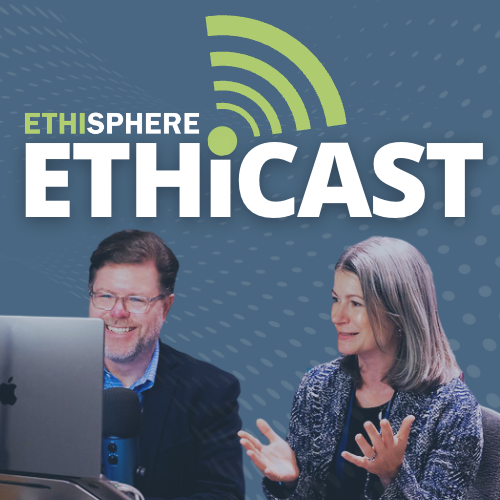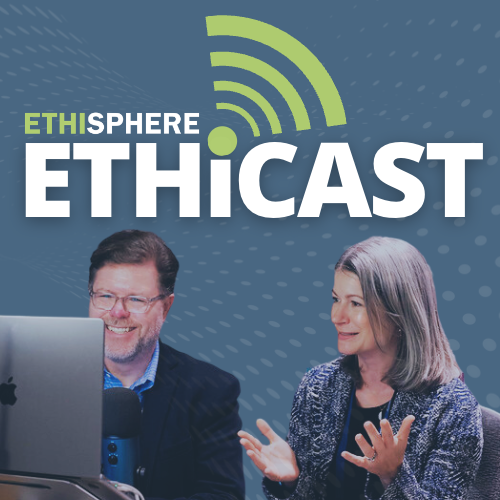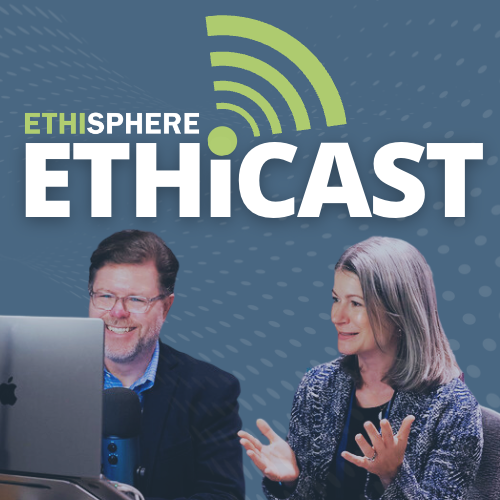[00:00:00] Speaker A: Hi everyone. The Business Ethics Leadership alliance has questions and we have answers. I'm your host, Bill Coffin. Welcome to another Bella Asks episode of the Ethicast.
One of the best benefits of being a member of the Business Ethics Leadership alliance or bella, is that if you have any questions at all about ethics and compliance, you can submit them to Bella's concierge service and one of our internal experts will provide an answer and direct you to a helpful resource for more information.
Many of these requests speak to broad challenges facing Bella members and by extension, the wider ethics and compliance profession. That's why we're using this show to thematically respond to high level questions from the Bella community. Joining us once again to answer those questions is Bella chair Erica Salmon Byrne. Erica, thanks for joining us once again. It's wonderful to see you.
[00:00:53] Speaker B: Oh Bill, as you know, this is one of my favorite things to do, so I'm happy to be here.
[00:00:58] Speaker A: Well, our next question is a board question and it reads how can I engage my board to drive tone at the top?
[00:01:05] Speaker B: And a lot of this is going to depend upon the particular personalities of your board and specifically the personality of the chair of the oversight committee for the ethics and compliance program. Because that person is your first and most natural champion or should be to think about when you think about kind of the independent director tone setting role inside the business. And so I should caveat my answer on this one with that point, Bill, which is I'm thinking about this from an independent non employee director coming in for company employees or stakeholders or third parties or whatever the case may be.
If you are a privately held company, everyone on your board is also an employee of the business. This is going to be a slightly different exercise for you to do. So I'll try to give a sense in my answer of kind of how to think about it. If you are PE owned or privately held and you don't actually have any outside directors, independent directors that are serving on your board. But let's assume we're talking about a publicly traded organization or a privately held organization with independent directors. So starting with the chair of the oversight committee for your program, that's your most natural person. There are a couple of things that you can think about doing with that individual. One is succession planning. So can you expose that person to other people on your team? Can you expose that committee to the rest of the organization? We actually have, Bill, in the sphere, which is our data platform, we have a ton of data on the ways in which you can expose your directors to other parts of the Business. So whether that is rotating board meetings, whether that is having directors meet with key third parties like suppliers or clients, whether that is exposing the committee or the directors to different levels of the organization so that they understand the depth of expertise that is available in the event that you move on or win the lottery or whatever the case may be. Those are all great practices. And I encourage anybody listening in who's a sphere subscriber to go pull those kinds of data points out of the sphere and look at what some of your peers might be doing in terms of that director risk exposure, business exposure kind of practices. The other thing to think about is your investigations process. We have seen a number of companies do things like having the chair of the oversight committee, in the event of a significant investigation, be part of the close process. So calling the person and saying thank you, right, thank you for bringing this issue to our attention. So we were able to resolve it. Expressing the gratitude of the organization. That's one thing to kind of think about in your co training, having the directors potentially be a part of the message setting. Directors saw this training or directors took this training and there, you know, because we believe that these standards apply from the highest levels of the organization all the way down to the lowest levels of the organization from a, from a stature perspective or a seniority perspective. So those are a few ideas to think about when it comes to the tone setting side side of it. But I would definitely be guided in all of this by the appetite that your oversight chair, oversight committee chair might have for some of this behavior because they're gonna be the most natural point person for you to look to for any of these kinds of tone setting activities.
[00:04:19] Speaker A: Do you mind if I ask you a follow up question?
[00:04:20] Speaker B: I never mind a follow up question, Bill.
[00:04:23] Speaker A: Well, this one derives from the fall issue of Ethosphere magazine, which, which we're working on at this very moment. But the special theme of it is leadership in the board. And we had a lot of really great interviews about board interactions. CECO is rising to the board, all kinds of things around, around this very topic. How often do we see boards that automatically get that notion of I have a responsibility to help drive home from the top. And how often do boards have to be educated on the notion of that responsibility that is part of what they're there to do.
[00:04:53] Speaker B: Independent directors get it now more than they used to, but there's still work to be done in terms of, you know, directors seeing that as a piece of their role.
I do think that there's more awareness of the natural interrelationship between the tone, the ethical culture, the oversight responsibilities, the discharge of your fiduciary duties than there used to be. But it's not. It's still not perfect, is what I would say. It's still not. It's still not where I'd like to see it. I have too many compliance professionals who will still say to me, well, there's a gatekeeper between me and my. My. My board members. Right? I have to go through the general counsel. I have to go through the corporate secretary. I have to go through the CEO. I don't have a natural interplay. I don't have an open relationship where I'm able to ask those things of the chair. And that is an issue. And. And that has been an issue that, unfortunately, it's still an issue because in 2010, we saw the amendments to the sentencing guidelines, which really emphasize the fact that the compliance and ethics team needs to have open access to the oversight committee that oversees the program. And of course, we learned that from the Hollinger case, where the general counsel was actually involved in the misconduct, and the people who were aware of that were. Had no connection point to the audit committee and were unable to raise that issue up to that level, which is the reason why we saw that reactive change in the sentencing guidance. And so for anybody out there who's listening to this, 14 years later that's still struggling with that issue, first off, I'm sorry, it is still an issue for too many compliance professionals. And, you know, you need just to just kind of keep pushing. And again, we've got great data in the sphere if you need benchmarking data to be able to push with. But that openness, that relationship, that engagement point is something we still need to work on.
[00:06:48] Speaker A: Erica, as always, super appreciate your insights on this, and thank you so much for returning to the program and weighing in on these questions from the Bella community.
[00:06:56] Speaker B: Oh, Bill, it is absolutely 100% my pleasure. So to all those Bella members out there listening into this, please do keep those questions coming so that I get a chance to come back and talk to my friend Bill and answer them.
[00:07:07] Speaker A: To learn more about Bella, please visit ethesphere.com Bella to request guest access to the member resource hub and to speak with the Bella Engagement director. And if you have a question that you would like answered on Bella Asks, be sure to use the Bella Concierge Service, and we'll get to your question just as soon as we can. Bill. I'm Bill Coffin, and this has been a special Bella Asks episode of the Ethicast. For more episodes, please Visit the Ethisphere YouTube
[email protected] ethisphere and if this is your first time enjoying the show, please make sure to like and subscribe on YouTube, Apple Podcasts or Spotify. Thanks so much for joining us. And until next time, remember, strong ethics is good business.


